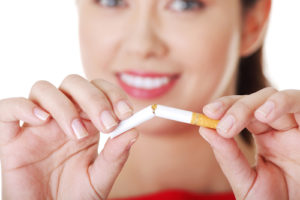Why is Smoking So Bad for Your Mouth?
 Smoking is bad for your whole body.Everyone knows it can cause lung cancer and emphysema.Most people know it increases your risk for heart disease and stroke.
Smoking is bad for your whole body.Everyone knows it can cause lung cancer and emphysema.Most people know it increases your risk for heart disease and stroke.
Did you know that even if smoking did NOT cause all of those problems, our dentists would still tell you to quit? That is because smoking is very harmful to the health of your mouth.
Dry Mouth
Smoking dries out your mouth.The more you smoke, the drier your mouth will become.If you take prescription medications in addition to smoking, your risk for dry mouth is extremely high.
Dry mouth predisposes you to many different dental problems because you are lacking the proper amount of protective saliva.
- Higher risk for cavities – Saliva neutralizes the pH of your mouth, protecting the outer shell of enamel and resisting cavities.Without saliva, the mouth becomes acidic, making it easier for bad bacteria to cause cavities by softening and weakening the enamel.
- Higher risk for gum disease – Saliva helps flush away plaque and keep it from adhering to the teeth.Without it, plaque stubbornly sticks to the teeth and gums, causing inflammation and irritation.If the plaque is not removed, it hardens into tartar (or calculus), which you cannot remove with your toothbrush and floss.Buildup attracts more buildup, and a vicious cycle begins that only a professional teeth cleaning can interrupt.
- Higher risk for mouth sores – Saliva functions to lubricate the soft tissue lining the inside of the mouth, including the tongue, lips, cheeks and gums.Without this protective lubrication, you are more likely to suffer from ulcers and mouth sores.You are also more likely to bite your lips, cheeks, or tongue.
- Digestive problems – Saliva contains important enzymes to break down complex compounds in food.Chewing and mixing the food with saliva is the first step in digestion.Without saliva, you miss this important first step and risk swallowing larger pieces of food, which can hurt the digestive process.Swallowing with a dry mouth becomes difficult, leading to frequent choking.
Because of these, and other, harmful effects of a dry mouth, you should stop smoking in order to avoid these dry mouth problems.
Poor Healing
Smokers do not heal as well as non-smokers.This is most likely due to the effect that nicotine has on the blood vessels.Smokers tend to have constricted blood vessels, which can lead to high blood pressure and reduced blood flow in various parts of the body.
When a patient is healing from an injury or a surgery, blood flow is of the utmost importance.Without adequate blood flow, the healing site lacks the proper cells and nutrients to regenerate.
Smokers have a higher failure rate of dental implants and a higher risk for dry socket after a tooth extraction.If you are in need of any major dental surgery, it is in your best interest to stop smoking several weeks before your surgery and do not resume . . . well . . . ever!
Persistent Gum Disease
Patients with periodontal disease experience bone loss around the roots of the teeth as a result of an inflammatory reaction in the body.Most often, the inflammatory reaction is in response to plaque and tartar buildup.
The treatment of the disease is the removal of all buildup above and below the gums in a “deep cleaning”.This removes the cause of the disease, but does not necessarily mean you will heal completely.In order to heal from periodontal disease, you must have good blood flow.As we discussed in the previous section, blood flow is necessary for healing.
Smokers have a much harder time kicking periodontal disease than non-smokers.If you are serious about good oral health, you must quit smoking.
Oral Cancer
Smoking (or using any form of tobacco) greatly increases your risk for oral cancer. Smokers are six times more likely to develop oral cancer than those who do not use tobacco.One statistic states that about 90 percent of people with oral cancer use tobacco.
Oral cancer risk increases the more you smoke, and the longer you smoke.This means that stopping sooner lowers your future risk for oral cancer!The sooner you stop smoking, the safer and healthier you will be.
Other Reasons to Stop Smoking
If your health is not reason enough to stop smoking, consider these more social reasons to stop smoking.
Bad Breath
Smokers have bad breath.There is no gum, mint or mouthwash that will cover the scent of cigarettes.By drying out your mouth, smoking also allows an overgrowth of bacteria that leads to even more bad breath.
For the sake of those who must work or live closely with you, stop smoking.
Teeth Staining
Smoking causes a yellowish to brownish discoloration on the teeth.Smokers’ stains will adhere to the edge of fillings and other dental work, leaving brown lines.These stains will not come out with teeth whitening.It may require removal and replacement of the dental work in order to completely remove the stains.
Yes, you may be able to improve some of the staining with professional teeth whitening, but if you continue smoking, the teeth will continue staining.The best way to maintain a beautiful white smile is to stop smoking.
More Questions about How Smoking Affects Your Mouth?
Contact Designer Smiles to schedule a consultation with Dr. Ann and Dr. Lauren today.Or ask Phyllis or Nancy at your next professional teeth cleaning.Our doctors and hygienists can answer any questions about how smoking affects your oral health.
